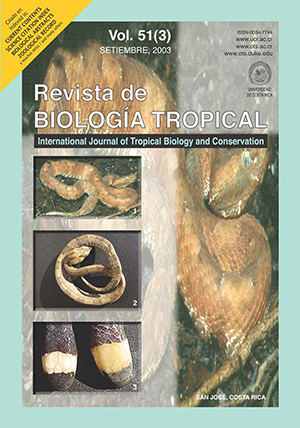Abstract
Strelkovimermis spiculatus is a common parasite of culicid species in Argentina. Effect of temperature on longevity and infectivity of juvenile preparasites of S. spiculatus was determined at 4, 10, 20 and 27ºC. Three containers with 100 ml of dechlorinate water and 300 preparasites (12 hour-old), were placed for each day and temperature, during 40 days (total = 480 containers). Survived preparasites were counted on 12 containers per day (three for each temperature). When number of survived preparasites was determined, second instar larvae of Aedes aegypti were added to each container in a 10:1 ratio (preparasites:mosquito) to determine infectivity of daily survived preparasites. Longevity of preparasites decreased at higher temperatures. Maximum longevity of preparasites maintained at 4, 10, 20 and 27ºC were 35, 30, 25 and 27 days, respectively. Survivorship of preparasites, exposed to the same temperatures, varied from 57% to 100% at day two, from 21% to 77% at day five and from 9% to 33% at day ten. Infectivity of preparasites maintained at temperatures from 4 to 27ºC was always higher than 70%. Extended longevity with maintenance of the infectivity capacity of preparasites, are important attributes to consider S. spiculatus an effective mean of controlling a large number of culicid species between 4 and 27ºC.##plugins.facebook.comentarios##

This work is licensed under a Creative Commons Attribution 4.0 International License.
Copyright (c) 2003 Revista de Biología Tropical
Downloads
Download data is not yet available.


